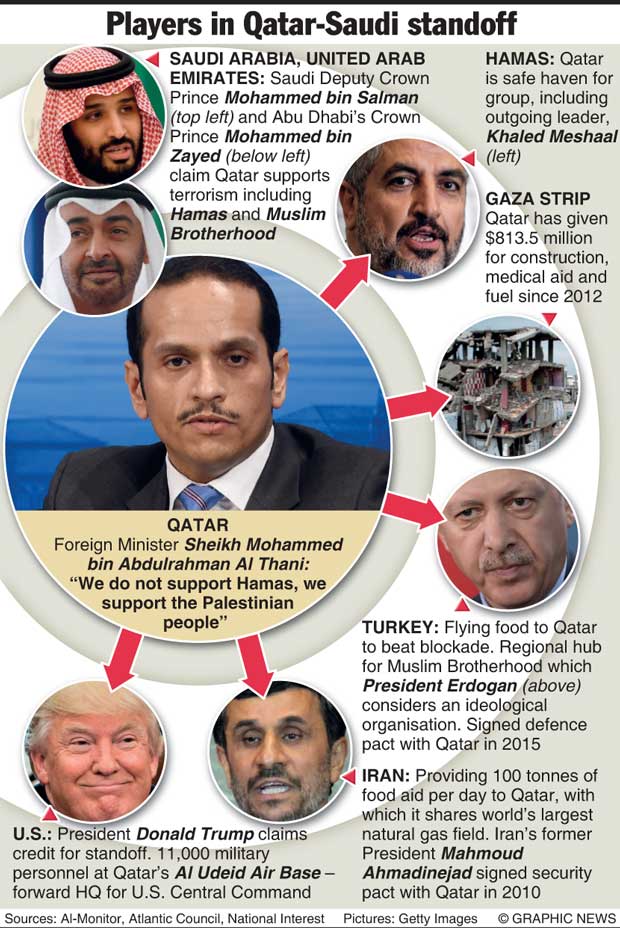16 Jun 2017 - {{hitsCtrl.values.hits}}
Notwithstanding a maverick President in the White House and China’s meteoric rise as a world power, the United States still sets the world agenda – and there is often an Israeli factor when it comes to the Middle East.

The latest Middle Eastern crisis – the spat between Qatar and a Saudi-led alliance -- is not spontaneous. That it did happen soon after US President Donald Trump was lavished with billion dollar gifts in Saudi Arabia was no coincidence.
Trump’s sword dance with Saudi Royals was in a way part of a pre-Ramadan party that reset the US partnership with the Saudi-led Sunni alliance. The Riyadh summit picture of Saudi King Salman, Egyptian President Abdel Fattah el-Sisi and Trump appearing like warlocks and touching a crystal ball shaped electric switch at the ludicrous launch of a new campaign against terrorism, speaks volumes of a new pro-Israeli and anti-Iran alliance.
It is no big secret that the Middle Eastern powers maintain backchannel contacts with Israel. Israeli newspaper Haaretz reported this week that Egyptian President Sisi held secret talks with Israeli Prime Minister Benjamin Netanyahu and opposition leader Isaac Herzog in Cairo in April last year. This meeting came two months after Sisi, Jordan’s King Abdullah, the then US Secretary of State John Kerry and Netanyahu met for a secret summit in the Jordanian port city of Aqaba. One of the topics on the agenda was a proposal that the Arab nations recognise Israel as a Jewish state.
Saudi Arabia, Israel and even the United States accusing Qatar of sponsoring terrorism, to quote Russia Today, is like McDonald accusing Burger King of selling junk food or Pepsi slamming Coco Cola for promoting unhealthy drinks
If the Arab leaders grant such recognition to Israel—and it could happen given their secret liaison with the Zionists—it won’t be long before Israel’s Arabs, who make up 20 percent of the population, are reduced to second class citizens. Even if the entire Arab population is thrown out of Israel and Al-Aqsa -- Islam’s third holiest mosque -- is demolished, it is doubtful that the so-called Arab leaders, let alone taking up arms, would raise even a finger at Israel.
Climate killer Trump’s visit to Saudi Arabia is a game changer in Israeli-Saudi relations. Any improvement in ties with Israel should be welcomed if it helps the Palestinians to achieve freedom. But Saudi Arabia’s focus is all about punishing Iran -- and the Palestinians are the sacrificial lamb or the disposables.
Saudi Arabia, like Israel, did not like President Barack Obama’s policies on Iran and Syria. They denounced Obama’s nuclear deal with Iran. Also, much to the chagrin of Saudi Arabia and Israel, Obama did not order the US military to attack Syria, Iran’s key ally.
Now the Saudis and Israel want the Trump administration to do what Obama refused to: Punish Iran and overthrow Bashar al Assad, who rules Sunni Muslim majority Syria, while being a vital link in the Iran-led Shiite power bloc that also includes Iraq and Lebanon’s Hezbollah militia.
Trump’s Iran policy is nothing but Israel’s Iran policy. He is all set to do the Saudi bid. But he will also promote the Israeli agenda as an additional price over the 450 billion dollar worth of deals Saudi Arabia gave the US last month. It involves isolating the Palestinian resistance group Hamas, putting Qatar on track and recognising Israel as a Jewish state and Jerusalem as its capital. Qatar not only maintains close trade and security relations with Iran but it is also a key supporter of the Palestinian freedom movement. It is with Qatar’s funds that Hamas is rebuilding the Gaza Strip which was virtually reduced to rubble by Israel in the 2008, 2012 and 2014 wars.
maintains close trade and security relations with Iran but it is also a key supporter of the Palestinian freedom movement. It is with Qatar’s funds that Hamas is rebuilding the Gaza Strip which was virtually reduced to rubble by Israel in the 2008, 2012 and 2014 wars.
Saudi Arabia and its vassal states probably found that of the conditions, acting against Qatar is the easiest to meet. The Saudis were more than happy to punish Qatar, because the two nations have a long history of troubled relations.
Given the zeal with which the Saudi royals hate Iran, it won’t come as a surprise if Saudi Arabia and its vassal states recognise Israel as a Jewish state with Jerusalem as its capital.
It has been widely reported that the intelligence chiefs of Gulf states have regular contacts with Israel’s intelligence chiefs. Two days before the Saudi-led alliance cut off ties with Qatar, media reports said that the United Arab Emirates’ Washington ambassador had close links with the pro-Israeli think tank – the Foundation for the Defence of Democracies.
Citing leaked emails, the reports said UAE ambassador Yousef al-Otaiba and the Foundation exchanged ideas and opinion regarding ways of handling Qatar due to its support of Hamas and Iran. According to Israeli newspaper Haaretz, al-Otaiba is fostering strong links with Jared Kushner, Trump’s Jewish son-in-law.
One Israeli minister told Washington-based Al-Monitor, “It is as though the Israeli-Saudi alliance is suddenly breaking out of its dark confines and being showcased internationally.”
Israeli Defence Minister Avigdor Liberman, however, said, “The Arab states who broke off diplomatic relations with Qatar didn’t do so because of Israel, nor did they do so because of the Palestinian issue. They did it because of their own concerns about radical Islamic terror. There can be no doubt that this opens many opportunities for cooperation in the war against terror.”
What a ridiculous statement! Hasn’t Liberman read about the Hillary Clinton emails, which accused Saudi Arabia of financing radical Islamic terror?
Qatar was only a scapegoat. Saudi Arabia, Israel and even the United States accusing Qatar of sponsoring terrorism, to quote Russia Today, is like McDonald accusing Burger King of selling junk food or Pepsi slamming Coco Cola for promoting unhealthy drinks. In their attempt to overthrow the Assad regime, Qatar and Saudi Arabia support rival jihadi groups, while Israel with its regular airstrikes on Syrian positions acts like the ISIS air force and allows wounded jihadis to receive treatment in Israeli hospitals. The United States’ terror war is also mired in double standards. Trump, on the one hand, accuses Qatar of supporting extremist groups, but on the other, he approved on Wednesday a US$ 12 billion deal to sell F-15 fighter jets to Qatar and sent two warships for a joint military exercise with the besieged nation where the US maintains its Middle East central command. The United States’ international relations history is also replete with reports of supporting terror groups ranging from Nicaragua’s Contra rebels to al-Qaeda affiliates in Libya and Syria.
One wonders whether the Qatar crisis, which now shows signs of a negotiated end after Turkey threw its full weight behind Qatar, was a deliberate move to keep the Palestinian issue out of international limelight at a time when the Palestinians observe the 50th anniversary of living under occupation after the 1967 Arab-Israeli war. With Qatar being the focus, there is hardly any international discussion on ending the Palestinian crisis at this crucial juncture of Palestine’s history.
Capitalising on the apathy, Israel took tough measures to further punish Hamas by slashing electricity supplies to the Gaza Strip and asking the United Nations Relief and Works Agency (UNRWA) to leave. The Israeli factor in the Saudi-Qatar crisis is too huge to be ignored.
30 Oct 2024 37 minute ago
30 Oct 2024 43 minute ago
30 Oct 2024 48 minute ago
30 Oct 2024 2 hours ago
30 Oct 2024 2 hours ago